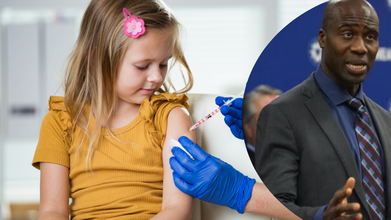- Health Conditions A-Z
- Health & Wellness
- Nutrition
- Fitness
- Health News
- Ayurveda
- Videos
- Medicine A-Z
- Parenting
- Web Stories
Why Elon Musk Is Turning To Surrogacy To 'Birth' His 'Lineage' Of Kids: Could Frequent Sperm Donation Have Side Effects?

Elon Musk, the richest human being in the world and one of the most divisive personalities of our time, is now making headlines for more than his space exploration, AI plans, or electric cars. A new Wall Street Journal expose has highlighted Musk's ambitious pursuit of legacy creation through surrogacy and sperm donation—a move based on his pro-natalist ideology to "battle civilizational collapse" by becoming the father of a large family.
Musk has been said to have fathered at least 14 children with four known women, although insiders claim that number is much higher. The latest installment of this saga comes from conservative influencer Ashley St Clair, who says she gave birth to Musk's child through a highly planned and secretive agreement. From multimillion-dollar settlements to NDAs and courtroom exchanges, the tale is like a sci-fi novel of today—except it's real life, and it spawns ethical and health-related concerns surrounding the application of surrogacy and sperm donation.
Elon Musk is not new to controversy, but this time it's not Twitter (now X) or Tesla shares. As reported by St Clair and the WSJ, Musk has pursued women actively—sometimes within politically sympathetic social networks—asking them to have his children through conventional or surrogate means. The influencer reports being isolated during her pregnancy and being given a reported payment of as much as $15 million, in addition to $100,000 per month support—substantially cut afterward when she spoke out.
This is not the only instance. Pop singer Grimes, Musk's ex-partner, has given birth to three children with him, and Shivon Zilis, an executive at Neuralink, has given birth to twins. There is even talk of a Japanese government official asking Musk for his sperm to donate—a request that Musk allegedly fulfilled. One message, which Musk sent to St Clair, encapsulates the ulterior motive: "To reach legion-level before the apocalypse, we will need to use surrogates."
Though surrogacy per se is not new or immoral when consensual and medically controlled, the Musk model—if these claims are true—raises legitimate questions about power imbalance, consent, and commodification of birth. Paying women huge amounts of money for biological legacy creation, and requiring them to sign confidentiality contracts and waive naming rights, distorts conventional definitions of co-parenting and individual agency.
Additionally, there have been reports indicating that women reportedly were threatened with the withdrawal of financial support if they pursued legal assistance or public debate—creating even more ethical controversy surrounding Musk's practices.
Can Frequent Sperm Donation Be Dangerous?
In a controlled clinical setting, sperm donation is quite safe. Sperm banks that are licensed screen donors thoroughly for infectious diseases like HIV, hepatitis B and C, and syphilis, as well as for genetic defects that can be transmitted to children. Legal safeguards also protect donors from relinquishing parental rights, which in turn protects both the donor and recipient from future legal issues.
Yet, frequent or casual sperm donation, as some accounts indicate Musk might be doing, poses a number of serious health and legal hazards:
Inadequate medical screening can raise the risk of passing on genetic or infectious disease.
Legal uncertainties in casual arrangements can expose recipients to future parental claims or financial responsibility by the donor.
Ethical risks, like an unchecked number of children, might result in unintentional incest among half-siblings who are not aware that they share a parent—especially when donors father kids around the world anonymously.
Psychological Impacts on Donor-Conceived Children
There's also a psychological aspect to this reproductive phenomenon. Sperm donation children tend to struggle with questions of identity, particularly if they learn about their origins later in life. When secrecy is valued—as Musk supposedly demanded in birth certificates and NDA provisions—the emotional toll might be compounded. Studies have found that open communication about donor conception early on leads to healthier psychological outcomes.
While the U.S. permits a variety of surrogacy and sperm donation arrangements, laws differ internationally, and Musk's possible multi-national parentage only makes things more difficult. Nations such as the UK, for example, limit the number of families that one sperm donor can assist in creating (typically ten). Such a limit does not exist in Musk's case, potentially setting up hundreds of biological children without legal or social knowledge of each other.
Additionally, private contracts formed outside of regulation—such as those outlined in the WSJ article—can be questionable across states, leaving both parents and the children vulnerable to legal complications in the future.
Musk's comments imply genuine faith in reversing demographic decline by personal reproduction. He has posted on Twitter repeatedly about the "population collapse" being a greater problem than global warming, terming childbearing as a "moral obligation of the intelligent" but where reproductive freedom gets tied to tremendous wealth and social status, boundaries between vision and ego get confused.
World Sexual Health Day 2025: Theme, Significance And What You Can Do To Make Sexual Wellness Everyday Health

Credits: Health and me
Each year on September 4, World Sexual Health Day invites governments, health experts, educators, and individuals to reflect on how sexual health shapes our overall well-being. In 2025, the observance comes with renewed urgency. The World Health Organization (WHO) and the United Nations’ Special Programme in Human Reproduction (HRP) emphasize that sexuality is not only a private matter but also a public health priority, one tied deeply to dignity, equity, and human rights.
The 2025 theme, "Sexual Justice: What Can We Do?", places responsibility in the hands of societies and individuals and challenges us to reimagine a world where sexual health and rights are not privileges but the integral elements of daily health.
Sexual health has traditionally been described by WHO as a state of physical, emotional, mental, and social well-being in sexual matters—not just the absence of disease. However, in reality, international public health policies have tended to emphasize risks, infection, and ill effects. This disconnect between definition and practice results in much everyday sexual health issues—pleasure, empowerment, equality—not being included in the discussion.
World Sexual Health Day aims to close that gap. It is not merely about decreasing infection or avoiding unwanted pregnancy but about allowing individuals to have positive, safe, and stigma-free experiences of sexuality.
World Sexual Health Day 2025 Theme: Sexual Justice, Sexual Justice: What Can We Do?
This year's theme is sexual justice, which is present when everyone—regardless of gender, age, sexual orientation, or social origin—is empowered, free, and equipped with the means to make informed choices about their bodies and sexual lives. This focus is divided into four main areas:
Sexual Rights: Preventing individuals from discrimination, stigma, and shame, and ensuring there is dignity in all sexual choices.
Sexual and Reproductive Rights: Protecting body autonomy and reproductive freedom.
LGBTQ+ Youth: Respecting the rights, identities, and interests of gender-diverse and sexual-minority youth, who are among the most at-risk populations in the world.
Access to Information: Ensuring sexual health education is accurate, evidence-based, and uncensored.
Cumulatively, these priority areas represent a worldwide commitment to removing obstacles that impede people from realizing complete sexual well-being.
Last year, WHO and HRP pushed forward priority research initiatives that define sexual health and sexual behavior on a global level.
Pleasure-focused communication campaigns: A systematic review of 29 HIV campaigns revealed that emphasizing pleasure—instead of fear or stigma—enhanced knowledge, increased condom use, and stimulated HIV testing. This is a paradigm shift: fun and empowerment are catalysts for safer sex behaviors.
Global research priorities for STIs: WHO had 40 areas for further research, including diagnosis, management, and prevention. These priorities are expected to direct researchers and policymakers in solidifying global STI control as antibiotic resistance makes it more challenging to treat.
Monitoring sexual health outcomes: Instruments such as the Sexual Health Assessment of Practices and Experiences (SHAPE) questionnaire are assisting countries in collecting data on sexual health practices and requirements, for which there is an evidence base to support improving policy. These observations bring a deeper truth into focus: sexual health is not merely preventing illness but promoting rights, empowerment, and pleasure as part of well-being.
Four Pillars of a Public Health Approach to Sexual Wellness
Researchers now propose a four-pillar model that recognizes the entire range of sexuality:
Sexual Health: Focusing on fertility, prevention of sexually transmitted infections (including HIV), prevention of sexual violence, and sexual functioning.
Sexual Pleasure: Identifying consent, safety, trust, and communication as facilitators for satisfaction and well-being.
Sexual Justice: Providing fair, inclusive, and rights-based access to sexual and reproductive health services.
Sexual Well-being: Embracing sexuality as a sign of health equity and a measure of general well-being, not just confining it to risks or dysfunctions.
These pillars in concert move sexual health policy away from a deficit-based approach towards one centered on equity, resilience, and empowerment.
Sexual health is not a specialty concern. It overlaps with human rights, social justice, and even ecological sustainability. To illustrate, the ecological footprint of menstrual hygiene materials has become a compelling concern, tying sexual health to wider environmental discussions. In the same vein, harmful gender norms and violence against women and LGBTQ+ are public health emergencies with spillover consequences to families, communities, and economies.
For countries, investing in sexual health translates to lower costs for health care, avoidance of long-term illness that comes from letting infections go untreated, and healthier, more resilient populations. For human beings, it translates to living with less fear, shame, and obstacles to intimacy and pleasure.
What You Can Do To Make Sexual Wellness Everyday Health?
World Sexual Health Day 2025 is not just about institutional reforms—it’s also about what individuals can do daily to support their own sexual well-being. Experts recommend:
Prioritize Intimacy
Carving out time for intimacy can be as important as scheduling exercise or meals. Reducing distractions and allowing space for relaxation can strengthen desire and connection.
Cultivate a Positive Mindset
Practice sex positivity—embracing that consensual sex is healthy and worth it—deconstructs guilt and shame. This attitude change can enhance enjoyment and emotional connection.
Support Physical Health
Physical activity increases blood flow and endurance, while sufficient sleep balances hormone levels. Both directly influence sexual function and desire.
Use Resources Wisely
From lubricants to medicinally approved aphrodisiacs, small instruments can reduce pain and increase pleasure. Overcoming physical obstacles like vaginal dryness or erectile dysfunction is part of self-care.
Practice Mindfulness
Attentive focus while being intimate allows for connection and increases pleasure. Yoga, meditation, and breathing exercises can reduce distraction and worry and create space for more satisfying experiences.
Sexual health is inseparable from overall well-being. World Sexual Health Day 2025’s focus on Sexual Justice reframes the conversation around rights, equity, and inclusivity, while inviting individuals to integrate sexual wellness into their daily health routines.
By treating sexual health as everyday health through policy, education, and personal practice we move closer to a future where sexuality is experienced with dignity, safety, and joy.
Florida Aims To End All Vaccine Mandates, Says State's Surgeon General Joseph Ladapo

Credits: iStock/AP
Florida is positioning itself to become the first U.S. state to eliminate all vaccine mandates, a sweeping move that challenges decades of established public health policy. At the center of this shift is Florida’s Surgeon General Joseph Ladapo, who likened vaccine mandates to “slavery” during a press conference, declaring, “All of them, every last one of them” must go.
If implemented, the decision would remove requirements for children to be immunized against diseases such as polio, measles, mumps, and hepatitis B before attending public school. It’s a proposal that has sparked alarm among medical professionals, educators, and health advocates—not just in Florida but across the nation and internationally.
Vaccine mandates in schools have long been considered a cornerstone of American public health. Since the mid-20th century, requirements for childhood immunizations have dramatically reduced once-devastating illnesses. Polio, which paralyzed thousands of U.S. children annually, is now nearly eradicated thanks to widespread vaccination. The measles vaccine alone is credited with saving millions of lives globally.
Every U.S. state currently requires some form of vaccination for children entering public schools, though most offer exemptions on medical, religious, or personal grounds. Florida, like many others, has traditionally enforced these rules to keep classrooms safe.
What makes Ladapo’s proposal unprecedented is not just its scope—striking down every existing mandate—but its political context. The Covid-19 pandemic shifted vaccination from a largely nonpartisan health measure into a deeply polarized cultural debate. Florida, under Governor Ron DeSantis, became a symbol of resistance to Covid-related restrictions. Now, that skepticism has expanded to encompass all vaccines.
What is The Florida Surgeon General’s Argument?
At the press conference, Ladapo framed his position in moral and religious terms. “Your body is a gift from God,” he said. “Who am I to tell you what your child should put in their body?” He went further, calling mandates “immoral” and equating them to forms of control unfit for a free society.
Supporters in the room cheered, but critics point out that his rhetoric dismisses decades of scientific consensus. Mandates, they argue, are not about control but about collective safety.
Opposition From Public Health Experts
Medical professionals across the spectrum have warned of the dangers that would follow a blanket repeal. The World Health Organization estimates vaccines have saved 154 million lives in the last half-century, mostly infants. The CDC reports that 4 million deaths are prevented globally every year by childhood immunizations.
Dr. Debra Houry, who recently resigned from her role as the CDC’s chief medical officer, warned that removing mandates could trigger outbreaks of preventable diseases. She cited last year’s flu season, in which about 270 U.S. children died—90 percent of them unvaccinated. “Vaccines are really important to prevent kids from having these significant diseases,” she told the BBC.
Dr. Nahid Bhadelia, an infectious disease expert at Boston University, echoed those concerns, pointing to Florida’s status as a major travel hub. “People come and go from Florida all over the world,” she said. “An outbreak there is not just Florida’s problem—it can quickly become a global one.”
Political Pushback in Florida
Florida’s Democratic lawmakers have been vocal in their opposition. Representative Anna Eskamani called the plan “reckless and dangerous,” warning that it would create “a public health disaster in the making.”
Educators are also speaking out. The Florida Education Association, which represents more than 120,000 teachers and administrators, condemned the move. Their statement highlighted the contradiction, state leaders claim to want to reduce absenteeism and improve education outcomes, yet weakening vaccination rules risks higher rates of illness and disruption in schools.
A National Divide on Vaccination Policy
Florida is not alone in rethinking vaccine mandates. Idaho, another Republican-led state, relaxed its requirements earlier this year, though it stopped short of a full repeal. Across the country, a growing number of conservative lawmakers are framing vaccines as an issue of personal liberty rather than public obligation.
At the same time, Democratic-led states are doubling down. Governors from Washington, Oregon, and California recently announced a health alliance to coordinate immunization policies, signaling their intent to uphold scientific guidance even as federal policies under the Trump administration face criticism.
This divide points to a future where vaccine policy could vary dramatically depending on geography, leaving some states far more vulnerable to outbreaks than others.
What Are The Global Stakes on Vaccinations?
Public health experts stress that Florida’s decision will not remain confined within its borders. In today’s interconnected world, diseases can spread rapidly across state and national lines. A measles outbreak in Florida, for instance, could impact international travelers or reintroduce the virus into regions that have worked hard to eliminate it.
There are also economic implications. Insurance companies may be less likely to cover immunizations if they are no longer mandated, raising costs for families and leaving vulnerable groups—including pregnant women and immunocompromised individuals—at greater risk.
Joseph Ladapo: Controversial Figure at the Center
Joseph Ladapo himself is no stranger to controversy. Appointed by Governor DeSantis, he has often been criticized by medical organizations for promoting skepticism about Covid vaccines. His latest move aligns with DeSantis’s broader efforts to position Florida as a symbol of resistance to federal health policies.
During his presidential campaign, DeSantis even called for a grand jury to investigate pharmaceutical companies over alleged misrepresentation of vaccine side effects. That rhetoric resonated with some voters but alarmed public health officials who saw it as undermining trust in lifesaving medicine.
Does This Sway The Future of Vaccine Mandates in America?
The trajectory is clear: vaccine policy is no longer a matter of medical consensus but of political identity. If Florida proceeds with its repeal, it will be the first state to take such a sweeping step, setting a precedent others may follow.
For now, the timeline remains uncertain. Some mandates can be rescinded through executive action, but others will require approval from the Republican-led state legislature. Ladapo’s repeated promise, however, leaves little doubt that the state is committed to pursuing the goal.
The debate over vaccine mandates is not new, but never before has a state moved to eliminate them entirely. Florida’s decision has the potential to reshape not only its own health landscape but also the nation’s—and even the world’s.
Critics argue that abandoning mandates risks undoing decades of progress in controlling deadly diseases. Supporters frame it as a victory for personal freedom. Between those two positions lies a stark reality: the viruses themselves remain unchanged, waiting for any lapse in vigilance to reemerge.
Florida’s gamble, if carried through, will test just how much risk society is willing to accept in the name of individual choice.
Bruce Willis' Wife Emma Slams Trolls On Moving Bruce To Another House Amid Dementia Decline

(Credit-brucewillisbw/Instagram)
One of the biggest stars of Hollywood, Bruce Willis, who played roles in iconic movies like Die Hard and The Sixth Sense, has been going through dementia. Diagnosed in the year 2022 with aphasia, a condition that affects your speech, a year later he was diagnosed with the real cause for this loss, which is frontotemporal dementia (FTD).
This type of dementia gradually affects your speech, behavior and cognition. His wife, Emma Hemmings, has been sharing updates about his health and his declining dementia, with his fans and well-wishers. She has also been a strong advocate for FTD awareness as well as caregivers’ care, something that is overlooked a lot.
However, things have not been as well and good as we hoped. Recently, news of Emma having to move the Die-Hard legend to a different home for better dementia care. This news was not well-taken by a lot of people, she says she has been unfairly judged for how she cares for her husband. In a recent Instagram post, she responded to criticism she received after a joint ABC special with her husband, "Emma and Bruce Willis: The Unexpected Journey."
Bruce Willis Dementia Care Home Update
In the special, Emma revealed that the family made the difficult decision to move Bruce into a separate one-story house. He lives there with a full-time care team, while Emma and their two young daughters, Mabel, 13, and Evelyn, 11, live in the family's primary residence.
Emma brings the girls to visit Bruce "a lot" for meals and other visits. She explained that the arrangement was made for the girls' benefit. "Bruce would want them to be in a home that was more tailored to their needs, not his needs," she said.

Why Is Emma Hemmings Facing Backlash?
After the special aired, Emma received criticism from viewers about her choices. On Instagram, she expressed frustration with those who judge caregivers without understanding their situation. "Too often, caregivers are judged quickly and unfairly by those who haven’t lived this journey or stood on the front lines of it," she wrote.
She added that while sharing her story invites opinions, it also creates a connection with other caregivers who understand the challenges of looking after a loved one with dementia. Bruce's daughter, Tallulah Willis, whom he shares with ex-wife Demi Moore, commented on the post, praising Emma and thanking her for all she does for the family.
In her post, Emma also read a passage from her upcoming memoir, The Unexpected Journey, which details the advice she once received from a therapist. The advice highlighted the difference between having an opinion and having an experience, noting that those without the experience "don't get a say, and they definitely don't get a vote."
How Has Dementia Affected Bruce Willis?
Bruce Willis withdrew from acting in 2022 after being diagnosed with aphasia, a condition that affects language and communication. In 2023, his family shared that his condition had progressed to FTD, a form of dementia that impacts language and personality but doesn't initially cause memory loss.
Despite the challenges, Emma shared that Bruce "is still very mobile" and in "really great health overall." She emphasized that while his brain is failing him, "he is still very much here." The entire family, including his ex-wife Demi Moore and their three older daughters, has rallied together to support him.
© 2024 Bennett, Coleman & Company Limited

